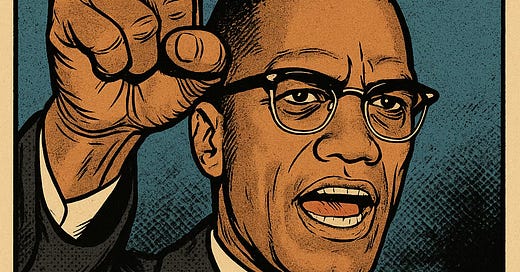Malcolm X at 100: What the Guardians of Decay Don’t Want You to Remember
Every legacy system has its enforcers. Malcolm X made them nervous. He still does.
“There is no better teacher than adversity. Every defeat, every heartbreak, every loss, contains its own seed, its own lesson on how to improve your performance the next time.”
– Malcolm X
May 19, 1925
One hundred years ago, Malcolm X was born.1
To mark this anniversary, almost no one said a word.
No official day of reflection. No national ceremony. No bipartisan praise.
Not because he was irrelevant but because he still threatens the unexamined order.
And maybe that's why I consider him a hero worthy of much deeper study and understanding.
Classifications Are Cages
The mainstream teaches you to pick your saints and villains from a fixed menu. If you're conservative, he was dangerous and you're supposed to fear Malcolm X. If you're progressive, he was righteous so long as you sanitize him.
None of these boxes hold up. All of them are too convenient.
The truth is that Malcolm X was never meant to be easy to digest.
Because Malcolm X evolved, and evolutio…
Keep reading with a 7-day free trial
Subscribe to The Whirl of ReOrientation: Escape the Script. Win the War. to keep reading this post and get 7 days of free access to the full post archives.




